- Home
- S. C. Stephens
Under the Northern Lights Page 13
Under the Northern Lights Read online
Page 13
I was sitting at the kitchen table waiting for him when he finally came home an hour or so after full darkness. He glanced my way, tilted his head in some sort of nod that was supposed to be a greeting, then shuffled over to the basin to wash his hands.
“Hello, Michael,” I said, my voice crisp. “How was work?”
Eyes on his hands, he gave me a one-word answer in response. “Good.”
Frustration made my eyes well with tears. We’d been on the road to getting really close, and now there was a dam-size wall between us. And he was putting it there, erecting it brick by brick with his frosty attitude and feigned indifference. Clenching my hands into fists, I slowly stood from the table.
“If this is the way things are going to be from now on, then why don’t I do us both a favor and leave. I’m sure you’ll appreciate my absence.” I knew it was a ridiculous statement—I wouldn’t last a week out there on my own with practically zero supplies. Michael knew it, too, and he looked up at me with shock on his face . . . and a trace of fear in his pale eyes.
“What? No, you can’t go out there by yourself. It’s too dangerous.” Drying off his hands, he came over to stand in front of me. He’d been avoiding looking at me since last night, and now, having the full force of his gaze upon me was almost overwhelming. I just wanted to wrap my arms around him, tell him he didn’t have to be scared of this . . . of us.
Crossing my arms over my chest, I stared him down. “Then stop giving me the silent treatment. You wanted to kiss me, so you did. And it was wonderful.” My voice grew soft as the memory flooded through me.
Michael sighed and hung his head. “It was,” he admitted, his voice equally soft. Feeling bolstered by his admission, I took a step toward him. His eyes flashed up to mine, and he held his hand out to stop me. “But it can’t happen, Mallory. I can’t let this happen.”
He indicated the two of us with his hand, and I frowned. “Why?” I asked, tossing my hands into the air. “Because I’m leaving? I know that. You know that. Can’t we enjoy this while it lasts?” He looked away, and I took a step toward him. “I didn’t think I would ever want a winter romance, Michael. I didn’t think I could handle it . . . but then, the weirdest thing happened.”
When I paused for effect, he returned his eyes to me. Curiosity swam in them. Gently, carefully, I laid my hand on his arm. “I realized that I couldn’t stop myself from liking you, couldn’t stop myself from caring about you. Whether or not I acted on it, I was already having a winter romance with you. I am having a romance with you. Right now . . . because I like you . . . so much.”
Michael swallowed, and his pale eyes were suddenly bursting with pain. “You shouldn’t,” he whispered.
“Why?” I answered. “Because you don’t want to leave here? I understand that, and I’m not—”
He shook his head, interrupting me. “No . . . because I meant what I said . . . about not having a heart. Or maybe I do . . . it’s just . . . taken.”
I blinked in confusion, not understanding. “Taken?”
With a sigh, Michael grabbed both of my hands. His were cool from the water, calloused from his hard life, but they felt incredible around mine. “I’m in love with my wife. Still. I came out here to get over her . . . but I don’t think I ever will. She’s all I see, all I think about, and there just isn’t anything left of me to give to you. I’m a shell . . . and you deserve better than that.”
If he had intended his words to push me away, they had the opposite effect—my heart surged with compassion, and I felt even closer to him. It wasn’t that he didn’t have a heart; it was that his heart was broken, shattered . . . and all I wanted to do was fix it. Love on him until he healed, until he could feel again, because I was certain that he could love again in time. But time was a luxury we didn’t have.
“But you feel something for me?” I asked, my voice a whisper.
“I feel . . . guilty,” he answered, his eyes drifting to the floor.
Guilty because he couldn’t have feelings for me? Or guilty because he did? Biting my lip, I took one more step toward him so our chests were almost touching. “Your wife would want you to be happy again,” I told him. “She wouldn’t want you up here, hiding from the world in solitude. She would want you to live.”
His brows creased, and a myriad of emotions flickered through his eyes. He pulled away from me, yanking his hands free from mine. “And I wanted her to live, but sometimes we don’t get what we want.”
I sighed as defeat filled me. But he’d been holding on to this pain for so long. I knew he wouldn’t release it just because I told him to. Hoping I could help him heal by encouraging him to talk about it, I asked, “What happened to her? Did she get sick?”
His pale eyes grew hard and cold as ice; the snowbanks outside looked warmer. “No . . . she got shot.”
I hadn’t expected him to say that, and I blurted something before I could stop myself. “She was murdered?”
Michael’s expression cracked, and the anger shifted into pain. “Some gang-banger shot her for twenty bucks in her purse. I lost the love of my life . . . for twenty dollars.” He collapsed into a chair next to the table like his legs refused to keep him upright. I didn’t know what to say to that, didn’t know what string of sentences could possibly ease the pain of that kind of senseless loss.
“I’m so . . . I’m so sorry, Michael.”
He looked up at me with haunted eyes, like he was reliving the moment over and over. My chest constricted as I watched his pain. “Want to know the worst thing . . . the part that makes all of it so . . . unbearable?”
I couldn’t speak, so I merely nodded for him to continue.
“She didn’t die right away,” he said. “He shot her in the stomach, nicked her spinal cord, so she couldn’t walk, couldn’t get help. But she yelled. She was just a few feet from a busy street, and she cried out for help over and over, but no one did anything. Some of them told the police later that they were too scared, too unsure. They didn’t want to risk getting involved, so they didn’t do a damn thing to help her . . . until it was too late.”
My eyes filled with tears, tears that slid down my cheeks. Michael watched the drops rolling off my skin with a face devoid of emotion. “That’s why I won’t ever go back,” he murmured.
Wiping my face dry, I knelt in front of him. “Won’t go back . . . to New York?”
His eyes refocused as he reconnected with the present. “That’s why I won’t go back to anywhere people are. Humans are the worst species on this planet, and I don’t want to be among them again. Ever again.”
The heat in his tone and the vitriol in his words took me aback. “You can’t really feel that way. Not about everyone.”
He twisted his lips as he considered that. “There are a few . . . exceptions . . . but by and large, humans are not good, decent people. They’re selfish, conniving . . . cruel. I’d rather live out here with the animals than there in the thick of them. At least you know where you stand with animals. People, though . . . they’re just crazy.”
While I understood where his world beliefs stemmed from, I couldn’t agree with them. Not with his unrelenting ferocity. The human race was flawed, yes, but there was goodness to humanity that couldn’t be found in the animal kingdom. We were unique, special, and cutting our entire species out of his life seemed too extreme. Balance was everything; it ruled the world. “I understand that people let you down, and what happened to your wife . . . that was just . . . awful. But giving up and hiding out here isn’t the answer. I could show you a better side of people, something to give you hope again.”
His eyes seemed to deaden as he stared at me. “Hope is an illusion, as insubstantial as rainbows in the sky. I worked in the emergency room at a major hospital right in the heart of New York. I know what life is all about. I know what humanity is all about . . . and I want no part of it.” He pointed to my cross necklace. “Your Maker there, he messed up somewhere along the line when he created us. And if we were c
reated in his image . . . then I want no part of him either.”
He’d said yesterday that he hadn’t wanted to break my heart, but every word he was saying was slicing me open. How could I help someone so torn apart? “Michael . . .”
Holding a hand up, he stopped me. “We’re not going to agree about this . . . I can tell. You have your beliefs, I have mine, and we just . . . we shouldn’t talk about it, okay?”
I felt crushed, saddened, but I knew he was right. Until I could convince him to give humanity another chance, we’d never agree on this. Nodding, I told him, “Okay.” Then I stood up and headed for the door. I needed something to do after that conversation. Might as well start dinner.
The chill in the air felt good on my face as I walked to the shed to get some meat out of storage. The entire time I worked, I contemplated Michael. Grief had hardened him, turned his insides to stone. I wasn’t a therapist like my sister; I didn’t know how to help someone in that way. All I knew how to do was take pictures, and that seemed like a woefully inadequate skill at the moment. Michael needed true help, and I didn’t feel capable of giving it to him. It killed me to know that I would leave here with him still broken, that I would have failed in trying to help a good man. And I truly believed Michael was a good man—that was why he was in so much pain.
Gripping my necklace tight, I said a prayer for him. It was the only thing I could think to do.
When I returned to the cabin, Michael was pacing the room. He locked gazes with me when I closed the door, and his eyes were laced with regret and sadness. “I’m sorry,” he immediately said. “I know that was a lot to take. Sometimes I wish I didn’t feel this way . . . but I do, and I think I always will. And even if I . . . I like you too . . . between my feelings for my dead wife and my views on society and religion, I just don’t see any possibility of us . . . working.”
Even though hearing him say that he liked me too thrilled me in a way that nothing else had recently, I kind of agreed with him. He was too broken for me to fix. The two of us falling into a passionate relationship . . . it wouldn’t just be a bad idea. It would be catastrophic. “I know . . . and I think I understand now. But I can’t handle months of us ignoring each other. I really would rather live in the forest than face that every day. Can we still . . . be friends?”
A slim smile curved Michael’s lips. It was my favorite smile, the one that made my heart race. And looking at it now, I still felt flutters in my stomach . . . I probably always would. But right now, he was beyond my reach. His heart and mind were locked up tight, rusted shut from years of disuse and distrust. It would take a miracle to pry them open again, and I wasn’t sure that I could be that miracle for him. But I prayed that I was, because if Michael was ever going to be a whole human being again, then he desperately needed divine intervention.
He held out his hand to me like he’d done when we’d first met. “I really enjoy your friendship, Mallory, and I’d love it if we could keep . . . what we have.”
Confusion passed over his face after he said that, and I knew he looked that way because he wasn’t entirely sure just what we had. All he seemed to know was that, like me, he didn’t want what was between us to end. That gave me hope, because I was sure, in the deepest recesses of my soul, that what we had went deeper than friendship, and if he wanted to keep that alive, then a part of him wanted to live again, wanted to love again. His light hadn’t entirely been extinguished yet, and as I shook his hand, I could see the smallest kernel of a miracle begin to grow.
Chapter Fifteen
It was difficult to be around Michael after that day. Not because of what he’d said, not because of his thoughts on humanity, but because . . . I couldn’t stop thinking about that kiss. I also couldn’t stop thinking about his wife, a woman he was still in love with, bound to for eternity by guilt and regret. I couldn’t believe that his wife would want him to be this closed-off person, though. She’d want him to live, to be happy, to love those around him, not to hide away from everyone and everything. Hearing Michael’s views broke my heart, so I had to believe it would have broken hers too.
It made me miss my sister even more. I wished I could talk to her, ask her advice. She occasionally worked with veterans and had experience dealing with PTSD, and that seemed to me to be the closest thing to what Michael was going through. He’d been ripped open by a traumatic event, one he hadn’t even been present for, and the wound went deep; there was no sure way to stitch it, except time. And that was part of the problem. This isolated life that Michael was living—it was like being stuck inside a bubble of time. The seasons changed here, but nothing else. Every time the sun rose, it was like hitting the repeat button, and while the simplicity of that was refreshing, I had a feeling that it was also prolonging Michael’s grief. Without feeling time moving forward, there was no real way to heal. He was killing himself here. But I didn’t think I’d ever convince him of that.
In Michael’s mind, the outside world was an empty, cruel, heartless place . . . a war zone, one he didn’t wish to return to. If I felt the same way, I could understand and support his decision, but he was oversimplifying the human race. For every ounce of vileness, there was an equal—if not greater—amount of goodness. Sometimes you just had to look harder to find it. For some reason the negative aspects of life were abundant, prevalent. It was almost a daily assault on the senses: Here are all the horrible things you missed while you were away! You had to reach through the garbage to find the golden nuggets of pureness and light. I truly wished it were the other way around, but human beings tended to be intrigued with grief. While good deeds were praised, then forgotten, horrific deeds were forever etched on our psyches.
But that didn’t mean we were a lost cause. Like wayward children, we just needed . . . guidance. And I desperately wanted to be that shining light for Michael to follow. I just didn’t know how.
“How are you doing?” Michael asked one afternoon, his light eyes inquisitive. I was helping him with the trapline today, like I usually did when I didn’t have enough chores to keep me busy for a full day. Michael had asked me something similar to this question almost every day since our conversation, like he was afraid I viewed him differently now. And I supposed I did see him in a different way. It just wasn’t in a negative way like he probably thought.
Trudging through the thick drifts of snow, I shrugged. “My toes are a bit on the cold side, but other than that, I’m fine.”
He frowned at my answer; clearly he hadn’t been wondering about my physical discomfort. “Are you . . . do you . . . ?” With a sigh, he stopped talking. We’d both decided we’d never see eye to eye on certain subjects, so we shouldn’t talk about them, but he looked like he was having second thoughts. Or maybe doubts.
“I really am fine, Michael. I’m more . . . worried than anything.”
That made his eyes open wider as he looked over at me. “Worried? About me?”
“Yeah . . . I worry about what’s going to happen to you once I leave.” The truth of that statement settled on me like a cold stone upon my shoulders. How long could he continue like this? What would kill him first—the elements or the loneliness?
Michael stopped and turned to me. The snow falling around us was getting thicker, and heavy, fat flakes partially obscured his face. “I’ll be just fine, Mallory. I’ve lived this way for a while now . . . I’m not scared, so you shouldn’t be.”
Yes, but it wasn’t just where he was living that worried me. Not wanting to get into it, I gave him a small smile. He saw right through my attempt to be cheerful, and his eyes saddened. “I’ll be okay, Mallory. You don’t need to worry about me.”
“That’s just it,” I said. “I don’t need to worry about you, but I still do. I think a part of me will always worry about you.”
A slim smile curled his lips. “And a part of me will worry about you. I guess in that small way, we’ll always be connected.”
A very small way. Much too small for my taste.
T
he wind picked up, sending a slice of cold right through me, and the heavy snowfall suddenly became a near blanket of white. I could just barely make out Michael’s outline as he looked around. “This is starting to get really bad. We should go back.”
I turned around to get my bearings, but all I saw was white. It was disorienting, and panic began seeping into me as I realized that I had no idea what direction to go. Where was the cabin from here?
Afraid I’d lose him, too, I reached out for Michael’s hand and took a step toward him. “Where?” I asked, above the sound of the wind.
Michael looked lost, too, as he turned his head this way and that. He clenched my hand tight like he thought I might wander off if he released me. “Uh . . .” We both searched the ground, but the snow and wind had already erased our trail. We were lost . . . it had happened so fast, without warning, but I supposed that was how these things usually happened.
As my heart began to surge with anxiety, Michael took off his glove and dug into his pocket. “Shit,” he muttered; then he searched another pocket.
He seemed unsatisfied with every pocket he checked, so I finally asked him, “What are you looking for?”
“My compass,” he answered. “I usually keep one with my pocketknife and my lighter, but . . . I guess I wasn’t as prepared as I thought. I don’t have one on me.” He frowned after he said it like he didn’t know what to do now.
For a moment, I wondered if he hadn’t been prepared because of me. Were we about to die because he’d been so worried about me that it had distracted him from taking the necessary precautions? That seemed like a cruelly ironic fate, and I began to shiver as fear settled into every pore. I didn’t want to freeze to death in a snowstorm.

 Effortless
Effortless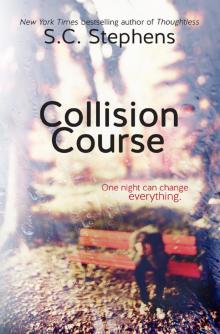 Collision Course
Collision Course Thoughtful
Thoughtful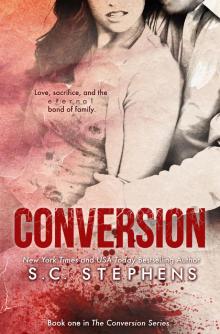 Conversion
Conversion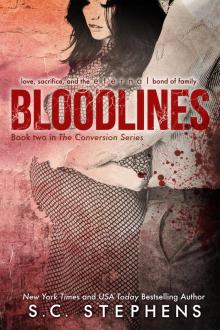 Bloodlines
Bloodlines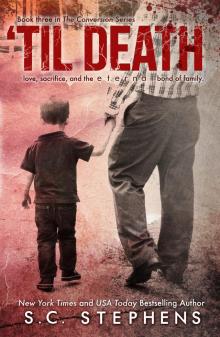 Til Death
Til Death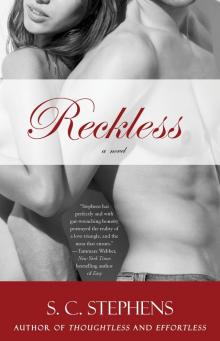 Reckless
Reckless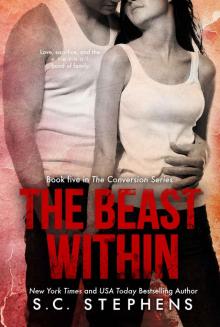 The Beast Within
The Beast Within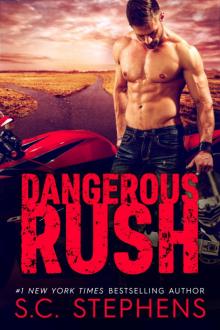 Dangerous Rush
Dangerous Rush Thoughtless
Thoughtless Untamed
Untamed Furious Rush
Furious Rush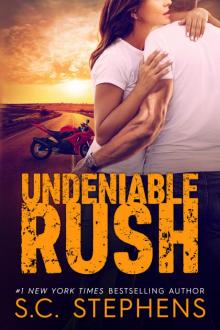 Undeniable Rush
Undeniable Rush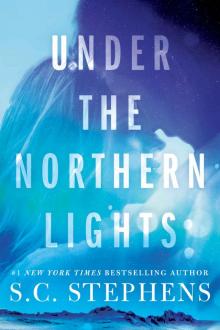 Under the Northern Lights
Under the Northern Lights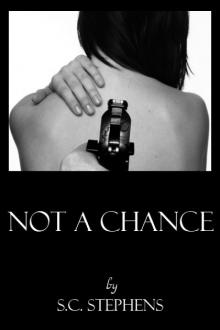 Second Rate Chances
Second Rate Chances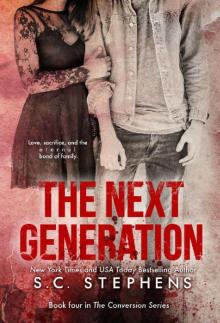 The Next Generation
The Next Generation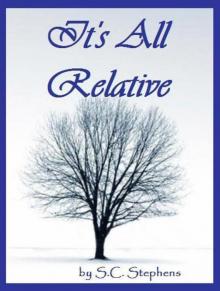 It's All Relative
It's All Relative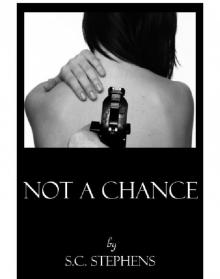 Not a Chance
Not a Chance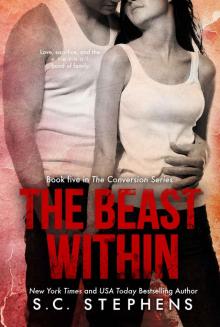 The Beast Within (Conversion Book 5)
The Beast Within (Conversion Book 5)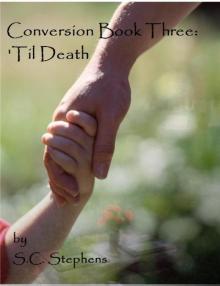 Conversion Book Three: 'Til Death
Conversion Book Three: 'Til Death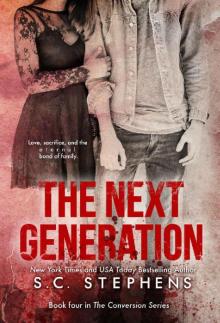 The Next Generation (Conversion Book 4)
The Next Generation (Conversion Book 4)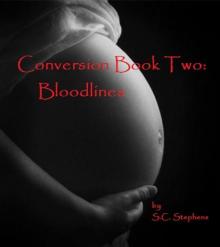 Conversion Book Two: Bloodlines
Conversion Book Two: Bloodlines